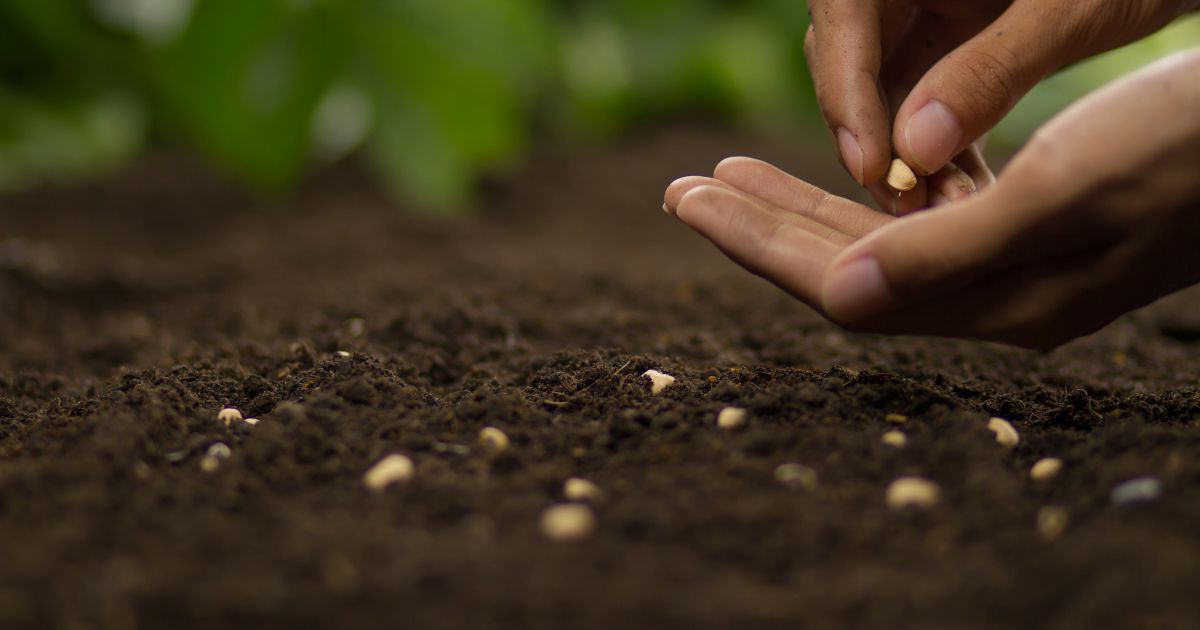In the world of healthy living, hidden treasures are waiting to be discovered, turning ordinary experiences into exciting adventures. Today, we reveal one such gem – the humble lemon seed. Often overlooked, lemon seeds have great potential. Picture the joy of growing your own lemon tree, whether in your backyard or on your windowsill, providing a continuous source of fresh, tangy lemons whenever you desire.
This isn’t just an idea; it’s a real opportunity waiting for you to seize. Come with us as we explore the incredible possibilities of lemon seeds, revealing the steps to grow your lemon tree. Say goodbye to buying lemons from stores and welcome a lifestyle focused on freshness and sustainability. In this article, we’ll provide you with a detailed guide, from choosing the right lemon to enjoying the fruits of your efforts, making this journey accessible and exciting for everyone.
Let’s start the journey where the ordinary becomes extraordinary, and the simple lemon seed becomes a pathway to a healthier, more sustainable life. Embrace the possibilities as we begin this citrus-filled adventure, uncovering the hidden potential of nature’s humble treasures.

Why Lemon Seeds Are Worth Keeping
In the vibrant world of fruits, lemons stand out for their versatile applications and tangy flavor. They are not only culinary staples but also hold a special place in various home remedies and natural treatments. Amidst the appreciation for the fruit itself, it’s easy to overlook the humble lemon seeds tucked within.
Yet, lemon seeds are far from insignificant. They hold a treasure trove of benefits waiting to be discovered. Beyond their role as mere remnants, lemon seeds are nature’s blueprint for future growth. Within each tiny seed lies the potential to cultivate your own lemon tree, yielding an endless supply of fresh, vitamin-rich fruit.
Here are some of the key benefits of lemon seeds:
- Rich in Antioxidants: Lemon seeds are abundant in antioxidants, such as vitamin C and flavonoids. These compounds help neutralize harmful free radicals in the body, reducing oxidative stress and inflammation. By consuming lemon seeds, you can support your body’s natural defense mechanisms against various chronic diseases, including heart disease, cancer, and neurodegenerative disorders. [1]
- Boost Immune Function: The high vitamin C content in lemon seeds makes them beneficial for immune health. Vitamin C is essential for the proper functioning of the immune system, helping to stimulate the production of white blood cells and antibodies that fight off infections. Regular consumption of lemon seeds may help strengthen your body’s defenses and reduce the risk of common illnesses like colds and flu. [2]
- Support Digestive Health: Lemon seeds contain dietary fiber, which plays a crucial role in promoting digestive health. Fiber helps regulate bowel movements, prevent constipation, and support a healthy gut microbiome. Additionally, the natural oils found in lemon seeds may have mild laxative properties, aiding in digestion and relieving digestive discomfort.
- Promote Skin Health: The essential oils present in lemon seeds have antimicrobial and astringent properties, making them beneficial for skin health. When applied topically or consumed internally, lemon seeds may help combat acne, reduce excess oil production, and promote a clearer complexion. Additionally, the antioxidants in lemon seeds can help protect the skin from damage caused by environmental factors and UV radiation. [3]
- Support Weight Management: Incorporating lemon seeds into your diet can support weight management efforts. The fiber content helps promote feelings of fullness and satiety, reducing overall calorie intake. Additionally, lemon seeds may help regulate blood sugar levels and improve insulin sensitivity, which can contribute to better weight control and metabolic health. [4]
- Improve Heart Health: The antioxidants and essential fatty acids found in lemon seeds may help support heart health. Antioxidants help reduce the risk of oxidative damage to blood vessels and reduce inflammation, while essential fatty acids can help lower cholesterol levels and improve blood lipid profiles. Consuming lemon seeds as part of a balanced diet may contribute to a lower risk of heart disease and stroke. [5]
- Natural Detoxification: Lemon seeds contain compounds that support the body’s natural detoxification processes. They help stimulate liver function, aiding in the removal of toxins and waste products from the body. Additionally, lemon seeds have diuretic properties, promoting the elimination of excess fluid and waste through the urinary system.[6]
By recognizing the worth of lemon seeds and incorporating them into our routines, we not only unlock the potential for sustainable growth but also harness the myriad health benefits they offer. So, before discarding lemon seeds, consider the untapped potential they hold and embrace the opportunity to cultivate a healthier, more vibrant lifestyle from seed to tree.
how to grow a lemon tree?
Let’s delve into the fascinating world of growing a lemon tree from these tiny seeds. You may be pleasantly surprised to discover that it’s a simpler and more rewarding process than you might have imagined.
Growing a lemon tree from seeds offers you the opportunity to partake in nature’s remarkable journey. It’s an endeavor that combines science, patience, and a touch of magic. In this section, we’ll guide you through the essential steps to nurture your lemon seeds into thriving trees.
Step 1: Selecting the Perfect Lemon
Before you embark on your lemon-growing adventure, it’s crucial to start with the right lemon fruit. Seek out lemons at your local market that boast a full, mature appearance and are free of blemishes, cuts, or bruises. These signs could indicate internal rot, jeopardizing the success of seed germination. By choosing a healthy lemon, you establish the foundation for successful seed propagation.
Step 2: Removing and Preparing the Seeds
Once you’ve acquired your selected lemon, delicately extract the seeds. Unlike cutting through the lemon, peel it as you would an orange. This method minimizes the risk of damaging the seeds with a knife or utensil. With gentle hands, open the individual slices, extract the seeds, and immerse them in a cup of water. Rinse the seeds thoroughly and allow them to dry on a towel before planting. Properly preparing the seeds ensures a higher likelihood of successful germination.
Step 3: Planting Your Lemon Seeds
Now that your lemon seeds are primed and ready, it’s time to plant them. Fill seed trays or small plastic pots with standard potting soil, lightly watering to ensure the soil is moist but not saturated. Utilize your index finger or a pencil to create holes approximately half an inch deep, placing one seed in each hole. Cover the seeds with soil and gently water without disturbing them. This step establishes the groundwork for the seeds to sprout and develop into young lemon plants.
Step 4: Providing the Ideal Environment
To optimize the germination and growth of your lemon seeds, select a warm, well-lit location. Consistent warmth and adequate light are imperative. Consider employing a horticultural heating mat and grow lights to expedite seedling germination and foster robust growth. The right environment is pivotal in nurturing your lemon seeds into healthy seedlings.
Step 5: Transplanting Your Seedlings
As your lemon seedlings flourish and produce their third set of leaves, it’s time to transplant them into larger containers. This transition enables their roots to expand and thrive without constraints. Depending on your geographical location and climate, you can maintain the containers indoors under grow lights or relocate them outdoors to bask in full sun exposure, promoting optimal growth and disease prevention.
Growing a lemon tree from seed is a gratifying experience that anyone can undertake with patience and care. In the forthcoming sections, we’ll delve deeper into the journey of nurturing your lemon tree, from selecting the right location to harvesting your very own lemons. Stay with us as we unveil the secrets of successful lemon cultivation, and soon, you’ll be relishing the fruits of your labor.

lemon seeds for planting: Selecting the Perfect Lemon
In your pursuit of growing a thriving lemon tree from seeds, the initial step is crucial: selecting the perfect lemon fruit. This seemingly simple task holds significant importance in ensuring the success of your lemon-growing endeavor. Let’s explore the key factors to consider when choosing the ideal lemon.
Choosing a lemon that has reached full maturity with a vibrant yellow hue is paramount. This coloration indicates that the seeds inside the lemon have had ample time to develop and are more likely to sprout successfully. Additionally, closely examine the lemon’s skin, opting for fruits that are devoid of blemishes, cuts, or bruises. Any damage to the skin can lead to rot inside the lemon, compromising the viability of the seeds.
Another essential aspect to consider is the firmness of the lemon. A ripe lemon should yield slightly to pressure but should not be overly soft or mushy. Firm lemons are more likely to contain healthy, viable seeds. Whenever feasible, prioritize organic lemons or those labeled as pesticide-free. This ensures that the lemon seeds you extract are devoid of chemical residues that might hinder germination.
While size and shape do not guarantee the quality of lemon seeds, it’s prudent to select lemons that are average in size and exhibit a typical lemon shape. Abnormalities may signify issues with seed development. By meticulously choosing the perfect lemon, you establish the groundwork for successful seed germination and the growth of a robust lemon tree.
Remember, each lemon you select represents a potential source of fresh, homegrown lemons in the future. With the right fruit in hand, you’re well on your way to creating your very own lemon oasis. So, embrace this pivotal step in your lemon-growing journey, knowing that the choices you make now will lay the foundation for a bountiful harvest down the line.
Providing the Ideal Environment
Creating the perfect environment for your lemon seeds is essential to ensure their growth and development into healthy lemon trees. In this section, we’ll explore the key factors that contribute to the ideal conditions for your seeds to thrive.
1. Consistent Warmth: Lemon seeds require a warm and stable environment to germinate successfully. Ensure that the location where you place your seed trays or pots maintains a consistent temperature, ideally between 70°F to 80°F (21°C to 27°C). This warmth mimics the natural conditions that encourage seed germination.
2. Adequate Lighting: Adequate lighting is crucial for the growth of your lemon seedlings. Lemon trees thrive in full sunlight, so consider placing them in a spot where they receive ample natural light. If natural light is limited, you can supplement it with grow lights to provide the necessary illumination.
3. Moisture Control: While lemon seeds need moisture to sprout, it’s essential to strike the right balance. Keep the soil consistently moist, but avoid overwatering, which can lead to rot and other issues. Ensure that the pots or trays you use have good drainage to prevent waterlogged soil.
4. Patience: Growing a lemon tree from seeds requires patience. Germination can take several weeks, so be prepared to wait. Keep a watchful eye on your seedlings, maintaining the warm and well-lit environment they need as they grow.
Providing the ideal environment for your lemon seeds is a crucial step in the journey of growing your lemon tree. It’s in this nurturing space that the seeds will awaken and begin their transformation into vibrant lemon plants. As you tend to their needs with care and diligence, you’ll witness the miracle of life unfolding before your eyes. Stay tuned for more insights on this exciting journey of growth and discovery.
Caring for Your Lemon Tree
As your lemon seeds begin to sprout and grow into young lemon plants, it’s crucial to provide them with the care and attention they need to thrive. In this section, we’ll discuss essential tips for nurturing your growing lemon tree:
1. Soil: Use well-draining soil to prevent root rot. Consider a cactus or succulent mix or incorporate materials like perlite for improved drainage.
2. Watering: Water deeply when the soil becomes dry to the touch, ensuring thorough hydration without overwatering. Consistency is key to maintaining optimal soil moisture levels.
3. Pest Management: Keep an eye out for common pests such as mealybugs and aphids, which can infest lemon trees. Utilize organic pesticides as needed to control pest populations and protect your tree’s health.
4. Indoor vs. Outdoor: Decide whether to keep your lemon tree indoors with grow lights or outdoors in full sun, depending on your climate and available space. Both options offer advantages, so choose the one that best suits your circumstances.
5. Transplanting and Pruning: As your lemon tree grows, periodically transplant it to larger containers to accommodate its expanding root system. Additionally, practice occasional pruning to maintain the tree’s shape and remove any damaged or diseased branches.
By providing your lemon tree with the right soil, proper watering, vigilant pest management, and suitable environmental conditions, you’ll ensure that it thrives and reaches its full potential. Embrace the journey of caring for your lemon tree, knowing that each action you take contributes to its health and vitality.
Embrace the Lemon Seed’s Hidden Potential
In the world of healthy living and inspiration, beauty often lies in the simplest of things. Lemon seeds, commonly discarded without a second thought, have revealed themselves as small yet mighty treasures. As we end our journey, let’s reflect on what we’ve uncovered.
Starting with the perfect lemon, we ventured into the art of growing a lemon tree from seeds. We’ve learned about the promise of growth and the importance of providing the ideal environment. We’ve discussed caring for your lemon tree, and ensuring its health and vitality. Throughout this journey, we’ve witnessed the miracle of life, as tiny seeds transformed into flourishing lemon plants.
Yet, this journey transcends the mere act of growing lemons; it’s about the connection we’ve forged with nature, the sustainability we’ve embraced, and the patience and wonder we’ve experienced along the way. It’s a reminder that even the smallest acts of nurturing life can bring extraordinary rewards.
So, why continue to discard lemon seeds and rely on store-bought lemons? Instead, let’s seize the opportunity to grow our lemon trees. With a little care and patience, we can savor the fruits of our labor, enjoying the freshness and zest of homegrown lemons.
As you revel in the bounty of your lemon tree, remember that this journey is a testament to the magic of nature and your role in preserving it. Join us in celebrating the hidden potential of lemon seeds and the boundless possibilities they offer. Your lemon tree awaits, ready to enrich your life with its bounty and the joy of a healthier, more sustainable lifestyle.
My Personal RX on Lemon Seeds Benefits
As a doctor, I’ve seen firsthand the remarkable impact that simple dietary changes can have on overall health. Incorporating lemon seeds into your routine can offer a multitude of benefits, promoting everything from immune protection to digestive health. Here are my top tips for maximizing the benefits of lemon seeds:
- Start Your Day with my Immune Support supplements: Kickstart your immune system by adding my Immune Support supplements to your morning breakfast routine. This will help fortify your body’s defenses against illness.
- Harness the Power of Nature with Lemon Seed Tea: Steep lemon seeds in hot water to create a soothing tea that supports digestion and detoxification. Sip it throughout the day for a refreshing boost.
- Get Your Guide to Holistic Health: Dive deeper into the world of wellness with my Protocol Guide e-book. Discover holistic approaches to nutrition, stress management, and more, complementing the benefits of lemon seeds.
- Snack Smart with Lemon Seed Energy Bites: Combine ground lemon seeds with dates, nuts, and coconut oil to create energy-boosting snacks that provide a dose of antioxidants and essential nutrients.
- Enhance Your Recipes with Lemon Seed Dressing: Create a nutritious dressing by blending lemon seeds with olive oil, garlic, and herbs. Drizzle it over salads or roasted vegetables for a burst of flavor and health benefits.
- Boost Your Fiber Intake with Lemon Seed Granola: Add whole lemon seeds to homemade granola for a crunchy, fiber-rich breakfast option that supports digestive health and keeps you feeling full.
- Support Skin Health with Lemon Seed Scrub: Mix ground lemon seeds with honey and yogurt to create a natural exfoliating scrub. Use it to gently remove dead skin cells and promote a healthy, radiant complexion.
- Create a Healing Lemon Seed Poultice: Grind lemon seeds into a paste and apply it topically to minor cuts, scrapes, or insect bites. The antimicrobial properties of lemon seeds can help prevent infection and promote faster healing.
- Add Lemon Seeds to Baked Goods for a Nutrient Boost: Incorporate ground lemon seeds into muffins, bread, or cookies for an added nutritional punch. Their subtle flavor pairs well with a variety of baked goods.
- Stay Hydrated with Lemon Seed Infused Water: Infuse water with lemon seeds and a few slices of lemon for a refreshing beverage that aids in hydration and supports detoxification. Sip it throughout the day for a delicious and healthful alternative to sugary drinks.
By incorporating these tips into your daily routine, you can harness the full potential of lemon seeds and enjoy their myriad health benefits. From boosting your immune system to supporting skin health, lemon seeds are a versatile and nutritious addition to any diet.
Sources:
- Park, Y. S., Kim, I. D., Dhungana, S. K., Park, E. J., Park, J. J., Kim, J. H., & Shin, D. H. (2021). Quality Characteristics and Antioxidant Potential of Lemon (Citrus limon Burm. f.) Seed Oil Extracted by Different Methods. Frontiers in nutrition, 8, 644406. https://doi.org/10.3389/fnut.2021.644406
- Carr, A. C., & Maggini, S. (2017). Vitamin C and Immune Function. Nutrients, 9(11), 1211. https://doi.org/10.3390/nu9111211
- Pullar, J. M., Carr, A. C., & Vissers, M. C. M. (2017). The Roles of Vitamin C in Skin Health. Nutrients, 9(8), 866. https://doi.org/10.3390/nu9080866
- Demir, A., & Celik, I. (2022). Investigation of healing effects of lemon (Citrus limonum) seeds lyophilized extracts on experimental diabetic rats. Archives of physiology and biochemistry, 128(2), 539–546. https://doi.org/10.1080/13813455.2019.1702061
- Huang D. (2018). Dietary Antioxidants and Health Promotion. Antioxidants (Basel, Switzerland), 7(1), 9. https://doi.org/10.3390/antiox7010009
- Ms, J. L. (2023, November 16). Benefits of drinking lemon water. https://www.medicalnewstoday.com/articles/318662#risks





















